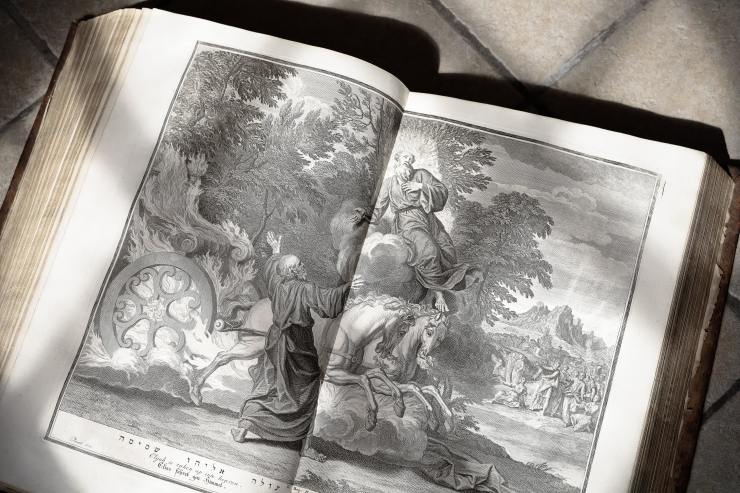
Jewish academic and Hebrew scholar Irene Lancaster delves into Elijah's dramatic confrontation with the prophets of Baal.
The Jewish community is currently studying the story of the Golden Calf in Exodus 30:11-34:35, and parallel to this story of idol worship in the wilderness comes the tale of Elijah and the prophets of Baal.
This tale can be found in the Book of Kings I 18:1-39. King Ahab from the House of Omri has married Jezebel, and Baal worship becomes the norm in the Northern Kingdom, often known as Samaria.
At this point Elijah appears and prophesies a drought that will last for a number of years. Elijah then hides by a brook and is fed by ravens. But then the brook also dries up.
Next, Elijah travels northward and is sustained by a poverty-stricken widow. Elijah performs a miracle which provides enough flour and oil until rain appears again.
In addition Elijah also revives the widow's son from a death-like state and the widow realizes that Elijah is a man of G-d.
Now we come to the subject of our current reading in Chapter 18. After three years, Elijah is to show himself to King Ahab and rain will resume.
In the meantime, the head of the palace household, Obadiah, has hidden the true prophets of G-d, as well as feeding them.
He encounters Elijah and acts as a go-between with Ahab. Ahab comes to meet Elijah and calls him 'a troubler of Israel'.
However, Elijah retorts that it is Ahab and his father's house who are the real troublers. By forsaking the mitzvot (commandments) of the Lord and worshipping the Baalim, it is they who have brought drought and famine to the land.
Ahab is to send the whole of Israel to Mount Carmel in Haifa, as well as the prophets of Baal and Ashera. And Elijah then utters the famous question to the assembled people:
'How long will you halt between two opinions?'
This rhetorical question implies that sometimes the people follow G-d and sometimes Baal. They cannot make up their minds as to who is the true G-d.
The word for 'halt' also means 'Pesach', thus alluding to the festival which takes place in less than a month.
The word here translated as 'opinions' also means a branch, a division or a divided opinion. It has even been translated in context as 'limping on two unequal legs'.
The people are told to cry out to their god to provide fire for their sacrifice. But in vain. And they even perform their ritual Baal dance, with no result. Elijah tells them to shout louder in case their god is otherwise engaged, or even asleep.
But to no avail, even when they started cutting themselves.
By contrast, Elijah takes 12 stones to symbolize the 12 tribes which make up the Jewish people, named 'Israel' by the true Lord. G-d provides fire for Elijah and his people and consumes their burnt offering.
And in verse 39, 'when all the people saw it, they fell on their faces and said: 'The Lord, He is G-d; the Lord He is G-d.'
The people now believe fully. They no longer sit on the fence. And this is an example of a miracle that came true, on top of Mount Carmel in Haifa, known as Elijah's city.
That is why the service for Yom Kippur, the Day of Atonement, ends with this profession of faith, first expressed by the Children of Israel on the top of Mount Carmel in Haifa.
In Chapter 19 Elijah is ready to pass on his mantle, as his life's mission is over. And in verse 12 he discovers that G-d is not in the loud noise of the wind, earthquake or fire, but in the 'still small voice'.
Soon after this, Elijah encounters Elisha, ploughing with 12 yoke of oxen, again symbolizing the 12 tribes of Israel, and 'cast his mantle over him'.
So often in life we prevaricate until it is too late. We don't make decisions when we should, thus enabling bad outcomes.
On the other hand, it is a gift to know when we should hand over the reins, when our work is done and when we should take a back seat.
The Hebrew Bible contains simple lessons for life, and none more so than the injunction on us to differentiate the false from the true.
And that is also why at the Pesach Seder we pour an extra cup of wine for the prophet Elijah, precursor of the Messiah. We leave the cup overnight, and miraculously by daybreak, the wine always disappears.
Republished from Christian Today UK.




